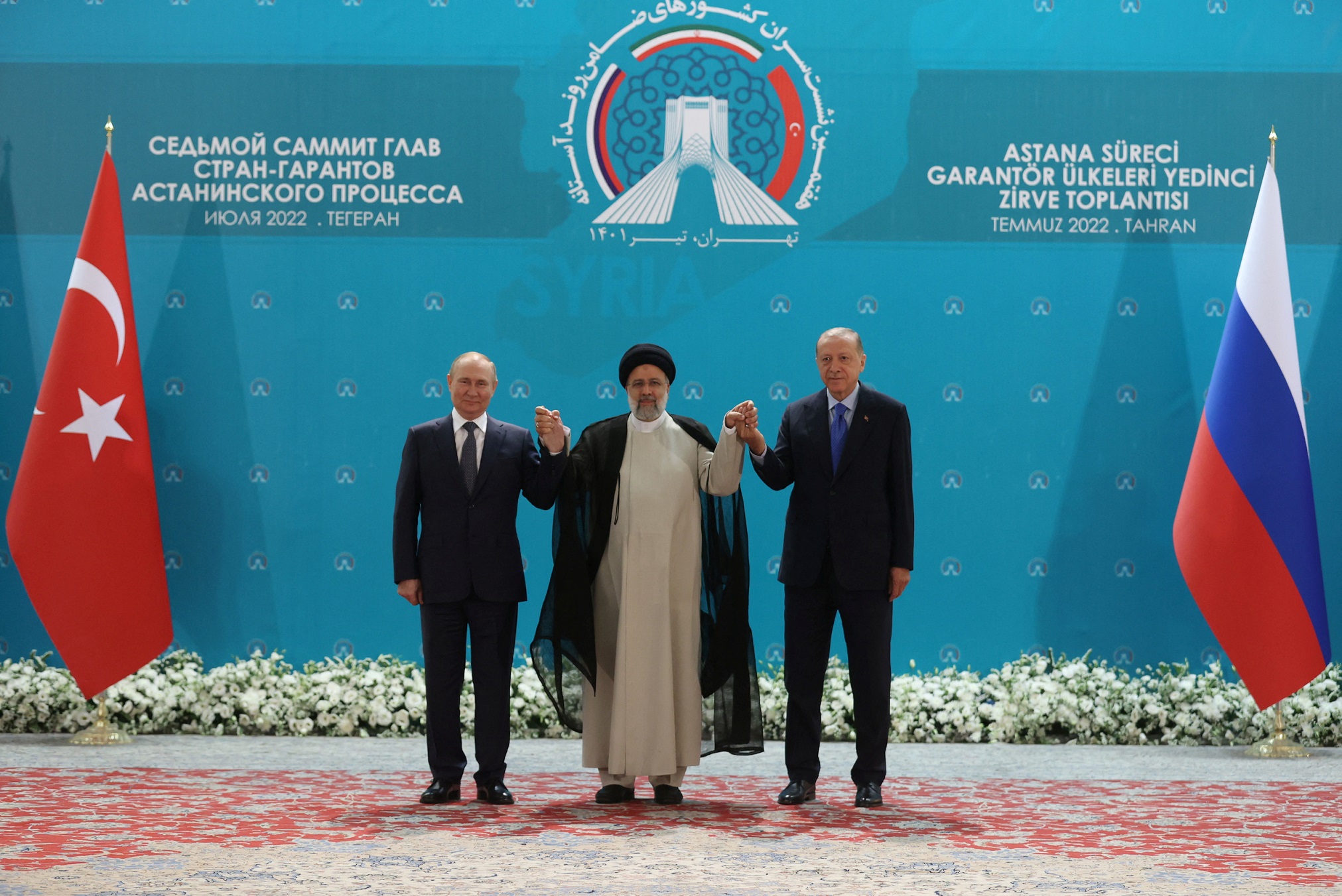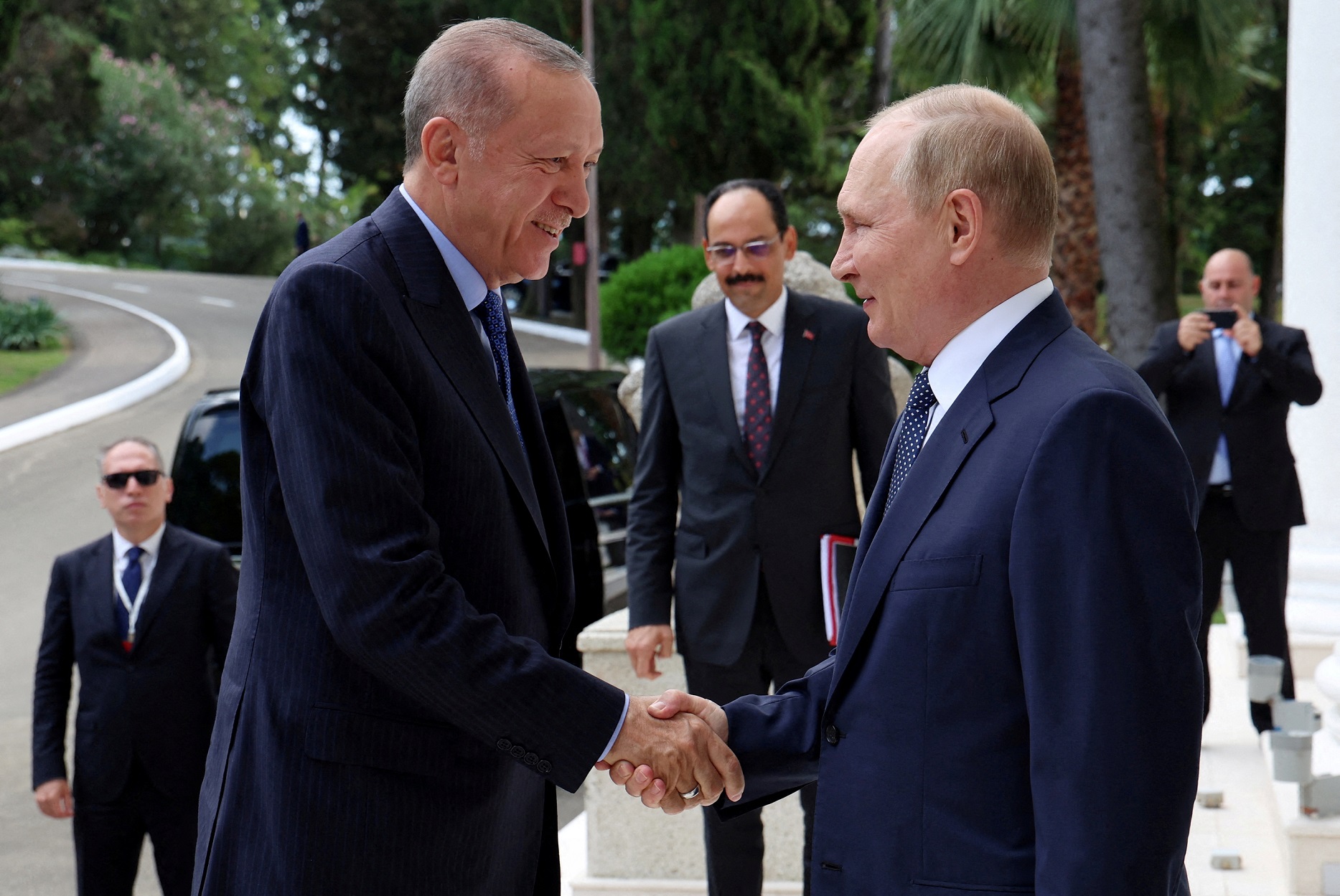Publications
INSS Insight No. 1630, August 16, 2022
The meeting in Sochi on August 5, 2022 between Russian President Vladimir Putin and Turkish President Recep Tayyip Erdogan, not long after their meeting in Tehran at the Astana Forum, reflects deepening cooperation between Moscow and Ankara. Moscow needs Ankara, partly in order to limit the negative economic ramifications of the war in Ukraine, but also to further weaken NATO from within. For its part, Ankara needs Moscow because of Russian influence in what it sees as main conflict zones– Syria, the Caucasus, and Libya, and given its dependence on Russia in matters of energy. Western countries are granting Ankara some leeway in its contacts with Moscow, partly as a broker on the conflict in Ukraine, in view of the importance of Turkey’s ongoing membership in NATO and its central location in the Black Sea theater. Israel should not conclude that the West will show the same tolerance toward it if it softens its position toward Russia. Moreover, Turkey is already paying a price for its relations with Russia, and it is expected to have to pay more in the future.
On August 5, 2022 Russian President Vladimir Putin and Turkish President Recep Tayyip Erdogan met in Sochi, Russia. Only a few weeks previously Putin and Erdogan met at a tripartite summit meeting of the Astana Forum in Tehran, which also included Iranian President Ebrahim Raisi. In September, Erdogan is expected to participate in a meeting in Uzbekistan of the Shanghai Cooperation Organization (SCO), an organization in which Turkey is defined as a “dialogue partner.” The bilateral meeting in Tehran between the Russian and Turkish Presidents lasted about one hour, while the Sochi meeting lasted about four hours. This lengthy meeting is evidence of the efforts made by both sides to cooperate, even if there are considerable conflicts of interest between them. Erdogan’s delegation to Russia included, inter alia, the Ministers of National Defense, Foreign Affairs, Treasury and Finance, Trade, Energy and Natural Resources, and Agriculture, as well as the head of Turkish National Intelligence Organization. Among the topics discussed were trade, energy, and a grain agreement with Ukraine, as well as Syria and the conflict in Nagorno-Karabakh, and an economic cooperation memorandum was signed during Erdogan’s visit. At the same time, the meeting illustrated Erdogan’s efforts to maneuver between Russia and the West, while protecting Turkey’s interests, including in the heated Black Sea arena. For his part, Putin is interested in strengthening ties with Turkey, a NATO member, in order to continue trying to drive a wedge between Ankara and the West, as in 2017, with the sale of the Russian S-400 air defense system to Turkey. This move led to Turkey’s removal from the F-35 project, although its membership in NATO remains a central component of Turkey’s security doctrine. Notwithstanding its initial objection, Ankara approved launching the process of bringing Sweden and Finland into NATO – a development that is highly displeasing to Moscow.
One of the subjects on the agenda at Sochi was the cooperation between Russia and Turkey in the field of energy, a matter of vital importance to both sides. The most significant energy project between Russia and Turkey is TurkStream, the gas pipeline from Russia to Turkey that is part of the Russian gas supply chain to eastern and central Europe. Presently, TurkStream operates almost with no disruptions compared to other pipelines carrying gas from Russia to Europe (although in June Russia stopped the supply of gas in TurkStream for a week, claiming maintenance work), and in Sochi, Putin even stressed that “European partners should be grateful to Turkey for ensuring uninterrupted transit of our gas to European markets.” For Erdogan it is important to maintain the supply of Russian gas as winter approaches and to avoid irregularities. Another achievement for Putin in this context is Erdogan’s consent to pay part of the cost of the gas supply in Russian currency. This is contrary to the position of most Western countries, which oppose this Russian demand.
Cooperation between the countries in the field of energy is also reflected in the construction of the first nuclear power plant in Turkey at Akkuyu and its future operation by the Russian state corporation Rosatom, with some major funding from the Russian bank Sberbank, which is subject to Western sanctions. Construction recently began on the fourth and last unit of the power station, and a total of $5 billion was transferred to Turkey, out of the $20 billion needed for the project. There are promises of a further two transfers of a similar amount in the near future, in order to dispel fears in Turkey that the sanctions on Russia caused by the war in Ukraine will delay the project. The power plant, which should eventually supply some 10 percent of the electricity in Turkey, is critical for the growing Turkish population. Erdogan stressed the importance of completing the project on time in 2023 (the year marking the centennial year of the Turkish republic and when elections are expected) without delays or hitches. The expectation is that the first unit of the power plant will begin operating in 2023.
Russia, which is under strong pressure from Western sanctions, is looking for alternative ways to obtain relief for its economy and in this endeavor has assigned Turkey an important role. In recent years there has been a significant increase in trade between the two countries, and Putin prides himself on this development. Turkey and Russia intend to continue accelerating their economic relations, including in the areas of trade, construction, agriculture, and tourism. Moreover, Russia, aiming to bypass the sanctions, has initiated contacts with five Turkish banks, with the aim of applying the use of Russian credit cards through the Mir system. In order to promote this move, meetings were held between the heads of central banks in both countries. These steps can strengthen the Russian currency and help stabilize the Russian economy. In addition, Turkey is among the few countries in the Western bloc that has maintained aviation ties with Russia, and it is also a tourist destination and important transit point for Russian citizens, particularly after the invasion of Ukraine. However, it is still not clear whether closer trading ties with Russia will lead Western companies active in Turkey to limit or even stop their activity there.

Another important achievement was the grain agreement between Russia and Ukraine, signed recently with the mediation of Turkey and the UN. The agreement should enable Ukraine to export grains, and thereby not only help its own economic situation, but also contribute to food security in many Third World countries, and in particular, the Middle East. The agreement will enable Russia to export agricultural produce and fertilizers, one of the country’s most important exports, and thus help it deal with the sanctions restrictions. Because of the expected positive impact in terms of reducing global food prices, Turkish mediation in the context of the grain agreement was welcomed in Western capitals.
The Syrian issue was likewise discussed in Sochi. Regarding Syria, as with Libya and Nagorno-Karabakh, Russian and Turkish interests are contradictory. For Erdogan, another military campaign in northern Syria is not only a security interest of the first order, but also important domestically, in view of the expected elections in 2023. Russian influence in Syria, like that of Iran, particularly in the Idlib region and among the Kurds, requires him to act with caution and coordination, even if limited, with Moscow. Before Erdogan’s visit, the Russian President’s spokesman called on Turkey to avoid moves that could lead to instability in Syria and endanger its “territorial and political integrity.” However, Russia stressed that Moscow understands Turkey’s concerns and its security considerations. At the meeting, Erdogan and Putin agreed to cooperate in order to combat various terror organizations (although clearly the two countries have opposing priorities with regard to the problematic organizations) and agreed on the importance of promoting the search for a political solution in Syria. Following the Sochi meeting, the Turkish Foreign Minister also surprisingly reported that he had briefly met his Syrian counterpart in October 2021, on the sidelines of the Non-Aligned Movement meeting in Belgrade. Nevertheless, in the foreseeable future it is hard to imagine a situation in which Turkey will agree to withdraw from areas of northern Syria over which it has control.
The meeting in Sochi symbolizes the drive of Russia and Turkey to intensify cooperation between them, in spite of their many conflicting interests. One of the most striking of these is the sale of Turkish weapons to Ukraine, particularly the Bayraktar TB2 drone – a Turkish drone that has caused considerable damage to the Russian forces in Ukraine. Nor is Turkey interested in reaching a situation where the Black Sea is under Russian domination. For Turkey, relations with Kyiv in the past have not only helped balance Russian influence on the Black Sea, but also had an element of security cooperation. However, thanks to the contacts with Ankara, Russia can ease its economic difficulties caused by sanctions, while Turkey gains economically and positions itself as a broker – not only between Russia and Ukraine, but to some extent also between Russia and the West. Turkey is becoming the main avenue through which Russia can still maintain some economic ties with the West, and Erdogan is managing to navigate the complex waters while maintaining Turkey’s interests.
Jerusalem, however, should not infer from Ankara’s room to maneuver granted by the West vis-à-vis its relations with Russia that Washington will treat Israel in the same way if it softens its stance toward Russia. The attitude toward Ankara is influenced above all by the fact that Turkey is a member of NATO and by its central location in the Black Sea arena. Moreover, it is important not to play down the price that Turkey already pays and is expected to pay in the future for navigating between Moscow and the West – in the context of restrictions on security procurement from the West and in the context of possible hesitation by Western companies to continue their economic activity in the country.



